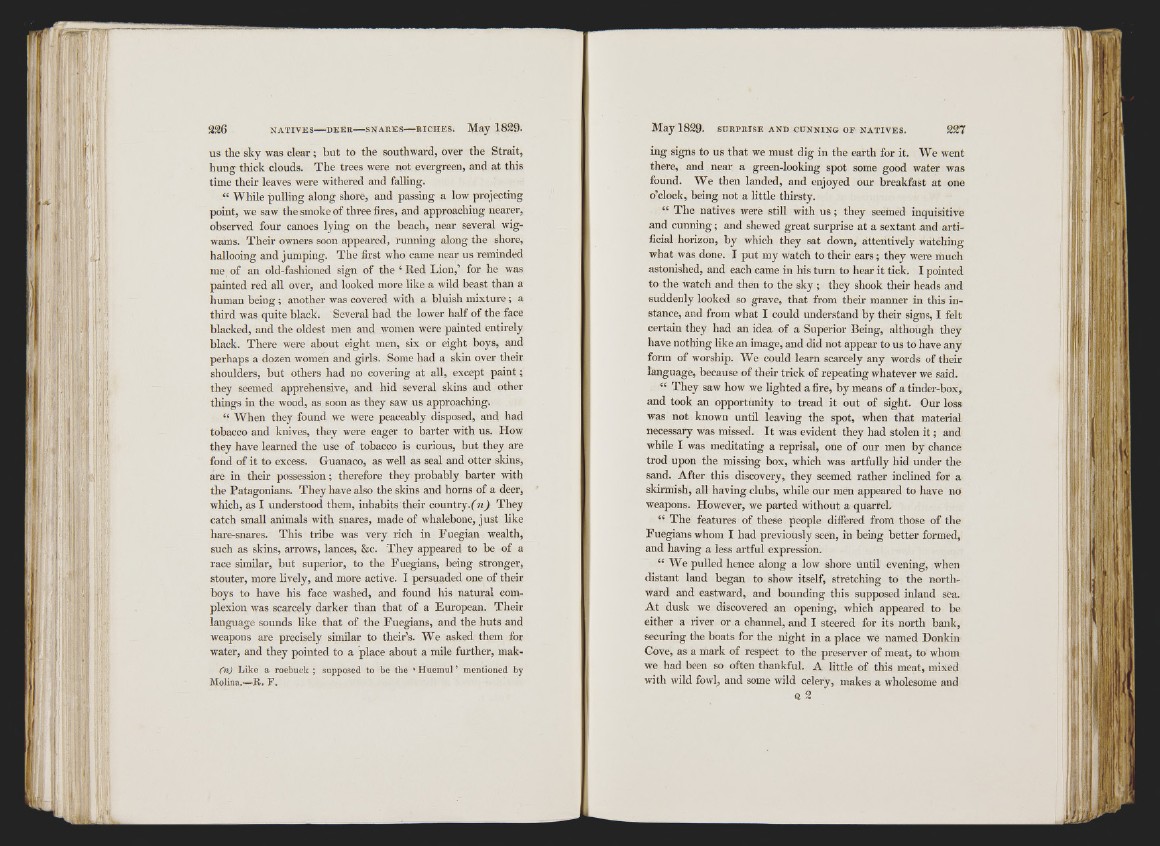
!
i il
us the sky was clear; but to the southward, over the Strait,
hung thick clouds. The trees were not evergreen, and at this
time their leaves were withered and faUing.
“ While pulling along shore, and passing a low projecting
point, we saw the smoke of three fires, and approaching nearer,
observed four canoes lying on the beach, near several wigwams.
Their owners soon appeared, running along the shore,
hallooing and jumping. The first who came near us reminded
me of an old-fashioned sign of the ‘ Red Lion,’ for he was
painted red all over, and looked more like a wild beast than a
human being ; another was covered with a bluish mixture; a
third was quite black. Several had the lower half of the face
blacked, and the oldest men and women were painted entirely
black. There were about eight men, six or eight hoys, and
perhaps a dozen women and girls. Some had a skin over their
shoulders, but others had no covering at all, except paint;
they seemed apprehensive, and hid several skins and other
things in the wood, as soon as they saw us approaching.
“ When they found we were peaceably disposed, and had
tobacco and knives, they were eager to barter with us. How
they have learned the use of tobacco is curious, but they are
fond of it to excess. Guanaco, as well as seal and otter skins,
are in their possession; therefore they probably barter with
the Patagonians. They have also the skins and horns of a deer,
which, as I understood them, inhabits their country.^n) They
catch small animals with snares, made of whalebone, just like
hare-snares. This tribe was very rich in Fuegian wealth,
such as skins, arrows, lances, &c. They appeared to he of a
race similar, but superior, to the Fuegians, being stronger,
stouter, more lively, and more active. I persuaded one of their
boys to have his face washed, and found his natural complexion
was scarcely darker than that of a European. Their
language sounds like that of the Fuegians, and the huts and
weapons are precisely similar to their’s. We asked them for
water, and they pointed to a place about a mile further, mak-
CnJ Like a roebuck ; supposed to be the ‘ Huemul ’ mentioned by-
Molina.—R . F .
ing signs to us that we must dig in the earth for it. We went
there, and near a green-looking spot some good water was
found. We then landed, and enjoyed our breakfast at one
o’clock, being not a little thirsty.
“ The natives were still with u s ; they seemed inquisitive
and cunning; and shewed great surprise at a sextant and artificial
horizon, by which they sat down, attentively watching
what was done. I put my watch to their ears; they were much
astonished, and each came in his turn to hear it tick. I pointed
to the watch and then to the sky ; they shook their heads and
suddenly looked so grave, that from their manner in this instance,
and from what I could understand by their signs, I felt
certain they had an idea of a Superior Being, although they
have nothing like an image, and did not appear to us to have any
form of worship. We could learn scarcely any words of their
language, because of their trick of repeating whatever we said.
“ They saw how we lighted a fire, by means of a tinder-box,
and took an opportunity to tread it out of sight. Our loss
was not known until leaving the spot, when that material
necessary was missed. It was evident they had stolen i t ; and
while I was meditating a reprisal, one of our men by chance
trod upon the missing box, which was artfully hid under the
sand. After this discovery, they seemed rather inclined for a
skirmish, all having clubs, while our men appeared to have no
weapons. However, we parted without a quarrel.
“ The features of these people difiered from those of the
Fuegians whom I had previously seen, in being better formed,
and having a less artful expression.
“ We pulled hence along a low shore until evening, when
distant land began to show itself, stretching to the northward
and eastward, and bounding this supposed inland sea.
At dusk we discovered an opening, which appeared to be
either a river or a channel, and I steered for its north bank,
securing the boats for the night in a place we named Donkin
Cove, as a mark of respect to the preserver of meat, to whom
we had been so often thankful. A little of this meat, mixed
with wild fowl, and some wild celery, makes a wholesome and
« 2
I
•i
1:1
:.l]